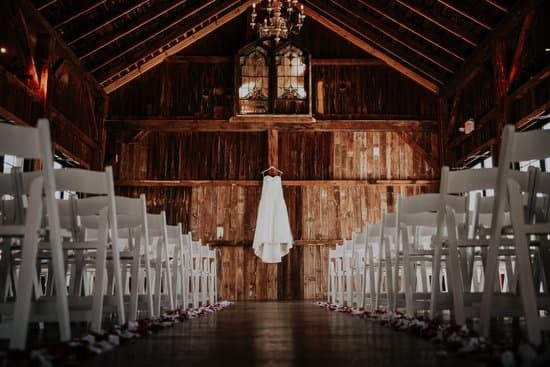Your wedding ceremony is a special occasion that marks the beginning of your life together as a couple. One of the most important aspects of your ceremony is what you say to one another as you exchange vows and promises. Knowing what to say in a wedding ceremony can set the tone for this momentous event and create lasting memories for both you and your guests.
Whether you choose to stick with traditional wedding vows or craft personalized ones, the words you speak during your ceremony will resonate throughout your marriage. From expressing love and commitment to sharing heartfelt sentiments, your wedding vows are a reflection of your unique bond and promise to each other.
In this article, we will explore different elements of a wedding ceremony script, including traditional and personalized vows, readings, cultural or religious elements, ring exchanges, unity rituals, closing remarks, and tips for writing and delivering your script. By understanding how each component contributes to the overall tone of your ceremony, you can create a meaningful and unforgettable experience for you and your partner on this special day.
Traditional Wedding Vows
When it comes to traditional wedding vows, couples often choose to adhere to classic and timeless words that have been spoken for generations. These vows typically include promises of love, commitment, and support through thick and thin. Whether reciting the traditional “to have and to hold” or “for better or for worse,” these vows hold special significance in a wedding ceremony.
For many couples, the exchange of traditional wedding vows adds a sense of familiarity and connection to the ceremony. These well-known words serve as a foundation for the marriage ahead, reminding the couple of the values and promises they are making to each other on their special day. The use of traditional vows can also resonate with family and friends present at the ceremony, evoking emotions of love and hope for the couple’s future together.
While some couples may choose to stick with traditional wedding vows as a way to honor tradition, others may opt for personalized vows that reflect their unique relationship and shared experiences. Ultimately, whether you decide on traditional or personalized vows, what matters most is that your words come from the heart and express your deep love and commitment to your partner.
Whichever path you choose, remember that what you say in your wedding ceremony has the power to set the tone for your marriage ahead.
Personalized Wedding Vows
Expressing Your Love and Commitment
When it comes to crafting your own personalized wedding vows, the key is to speak from the heart. It’s an opportunity to express your deepest feelings for your partner and make promises that are meaningful to both of you. Consider what makes your relationship special and incorporate those elements into your vows. Whether it’s a shared sense of humor, a common goal, or a unique bond, highlighting these aspects will make your vows truly personal and memorable.
Reflecting on Your Journey Together
Another way to personalize your wedding vows is by reflecting on your journey as a couple. Think about the experiences you’ve shared, the challenges you’ve overcome, and the growth you’ve experienced together. Incorporating these moments into your vows can add depth and meaning to your promises. By acknowledging how far you’ve come as a couple, you can reaffirm your commitment to each other and celebrate the love that has brought you to this moment.
Making Promises for the Future
In addition to looking back on your relationship, personalized wedding vows also allow you to look forward to the future. Consider what hopes and dreams you have for your life together as husband and wife.
Whether it’s supporting each other’s goals, creating a family, or embarking on new adventures, outlining these aspirations in your vows can set the tone for the marriage ahead. By making promises for the future, you are not only celebrating where you are now but also expressing excitement for all that is yet to come.
By taking the time to craft personalized wedding vows that reflect who you are as individuals and as a couple, you can create a ceremony that is truly unique and memorable. Remember that there is no right or wrong way when it comes to what to say in a wedding ceremony – as long as it comes from the heart, it will be perfect.
So take this opportunity to share your love with each other in a way that feels authentic and true to yourselves.
Wedding Ceremony Readings
When planning your wedding ceremony, incorporating readings can be a beautiful way to add depth and meaning to the special day. Whether you choose meaningful passages from literature, poetry, or religious texts, these readings can set the tone for your union and express the love you both share. Here are some ideas for wedding ceremony readings that can touch the hearts of your guests:
- Excerpt from “The Alchemist” by Paulo Coelho
- Poem “i carry your heart with me” by E.E. Cummings
- Religious passage from Corinthians 13:4-8
Including readings in your wedding ceremony provides an opportunity for loved ones to participate in a meaningful way, whether they are reciting the passages or listening attentively. These words have the power to resonate with everyone present and create a shared experience that will be remembered for years to come.
In addition to traditional readings, you may also choose to have friends or family members write personalized messages for you and your partner. These heartfelt words can be a surprise on the day of the wedding or shared beforehand so that they can be incorporated into the ceremony script. Personalized readings add a unique touch and showcase the love and support surrounding you as you begin this new chapter together.
- Encourage loved ones to share their favorite quotes or poems
- Ask a family member or friend to write a letter or message for the ceremony
- Select readings that hold special significance in your relationship
No matter what type of reading you choose for your wedding ceremony, remember that these words are meant to celebrate your love, honor your commitment, and inspire those present. By carefully selecting readings that reflect your values and beliefs, you can ensure that every word spoken during your ceremony is chosen with intention and love.
Including Cultural or Religious Elements in Your Ceremony
When planning a wedding ceremony, incorporating cultural or religious elements can add a unique and meaningful touch to the celebration. Honoring your heritage through traditions, rituals, or customs can make the ceremony more personal and representative of your background. Whether you come from different cultural backgrounds or share the same beliefs, finding ways to include these elements in your ceremony can create a memorable and inclusive experience for you, your partner, and your guests.
One common way to include cultural or religious elements in a wedding ceremony is through traditional rituals or practices. This could involve lighting a unity candle, performing a tea ceremony, or exchanging special vows and blessings that are specific to your culture or faith. By incorporating these traditions into your ceremony, you are not only honoring your heritage but also sharing it with your loved ones who may not be familiar with these customs.
Another option for including cultural or religious elements in your wedding ceremony is by choosing music, readings, or prayers that hold significance in your culture or faith. For example, you could select traditional songs or hymns that have been passed down through generations in your family, or have a family member recite a poem or scripture that holds special meaning.
These symbolic gestures can help create an atmosphere of inclusivity and respect for diverse backgrounds among those present at the wedding.
| Cultural Elements | Religious Elements |
|---|---|
| Incorporating traditional rituals such as lighting a unity candle | Selecting prayers or scripture readings specific to your faith |
| Choosing music that is significant in your culture | Having a religious leader perform blessings according to your faith tradition |
Exchange of Rings
The exchange of rings is a pivotal moment in any wedding ceremony, symbolizing the union and everlasting love between two individuals. As the couple places the wedding bands on each other’s fingers, they are showcasing their commitment to one another and declaring their intention to spend the rest of their lives together. This tradition dates back centuries and is a universal symbol of marriage and unity.
During the exchange of rings, couples often recite traditional vows or personalized promises to each other. Whether you choose to stick with classic vows or craft your own unique words, this moment allows you to express your love, devotion, and commitment openly in front of your loved ones. The act of exchanging rings not only binds you together as partners but also serves as a reminder of the promises you have made to each other on this special day.
In addition to the emotional significance of exchanging rings, the physical symbol itself holds deep meaning. The circular shape of the wedding band represents eternity and endless love, with no beginning or end.
As you exchange rings with your partner, it is a tangible representation of your unbreakable bond and a daily reminder of the vows you have spoken. The exchange of rings is a beautiful and meaningful tradition that adds depth and symbolism to your wedding ceremony, marking the beginning of your journey as a married couple.
Unity Rituals
Another meaningful unity ritual is the Sand Ceremony, where different colored sands are poured into a vessel, representing the blending of two individuals and families into one cohesive unit. This visual representation of unity can serve as a poignant reminder of your commitment to each other. Additionally, some couples choose to plant a tree together during their ceremony, symbolizing growth, strength, and the longevity of their relationship.
No matter which unity ritual you decide to incorporate into your wedding ceremony, it is essential to choose one that resonates with you and your partner personally. Whether it’s lighting a unity candle or planting a tree together, these rituals offer an opportunity for reflection on the merging of your lives and the journey ahead as a married couple.
| Unity Ritual | Symbolism |
|---|---|
| Unity Candle Ceremony | Joining of lives as one |
| Sand Ceremony | Blending of individuals and families |
| Tree Planting Ceremony | Growth, strength, and longevity of relationship |
Closing Remarks and Blessings
When it comes to the closing remarks and blessings in a wedding ceremony, it is important to leave a lasting impression on the newlyweds as they embark on this new chapter in their lives together. This final part of the ceremony serves as a heartfelt send-off, filled with love, well wishes, and blessings for the couple. It is a moment that encapsulates the joy and celebration of the day while looking forward to the future.
Expressing Gratitude and Well Wishes
As you wrap up the wedding ceremony, take a moment to express gratitude to all those who have come together to witness and celebrate this special occasion. Thank your guests for being a part of your journey as a couple and for their love and support. Share well wishes for the future, encouraging the newlyweds to cherish each other, communicate openly, and grow together in love and understanding.
Offering Blessings for the Journey Ahead
In addition to expressing well wishes, consider incorporating blessings into your closing remarks. Whether you draw from religious or spiritual traditions or offer words of hope and encouragement from your own heart, blessings can bring an added layer of depth and meaning to your wedding ceremony.
May these blessings guide you through challenges, strengthen your bond in times of difficulty, and fill your days with love, laughter, and happiness. Remember that these words will resonate with the couple long after the ceremony has ended.
Embracing Love and Unity
Ultimately, as you bid farewell to your guests and prepare to begin your new life together as spouses, let love be at the center of it all. Embrace the unity that comes with marriage, knowing that you have each other’s backs through thick and thin.
End your wedding ceremony with a heartfelt message of love – not just between you both but also extended outwards to all those present – leaving everyone feeling uplifted and inspired by the power of love shared on this beautiful day.
Tips for Writing and Delivering Your Wedding Ceremony Script
Crafting the perfect script for your wedding ceremony is essential to setting the tone and creating lasting memories for both you and your guests. Whether you choose to stick to traditional vows or craft personalized ones, what you say in your wedding ceremony holds significant weight in expressing your love and commitment to each other. Here are some tips to help you write and deliver a memorable wedding ceremony script.
Firstly, take the time to reflect on your relationship and what it means to you both. Consider what values and promises are important to incorporate into your vows. Personalized wedding vows can be a beautiful way to express your unique bond and create a truly intimate moment during the ceremony. Be sincere, heartfelt, and authentic in your words, as this will resonate with everyone present.
Additionally, consider incorporating readings or quotes that hold special meaning for you as a couple. These can add depth and emotion to the ceremony, sharing insights into your relationship with your loved ones. Whether it’s poetry, song lyrics, or passages from literature, choose pieces that reflect your love story. Remember that including cultural or religious elements can also bring extra significance to your ceremony, honoring your heritage and traditions in a meaningful way.
Conclusion
As you embark on the journey of marriage, it is essential to remember the power that words hold in your wedding ceremony. Whether you choose traditional vows, personalize your promises, include meaningful readings, or incorporate cultural and religious elements, the words spoken during your ceremony will shape the foundation of your union. The exchange of rings symbolizes your unity and everlasting love, while unity rituals further celebrate the merging of two lives in a profound way.
Closing remarks and blessings serve as a heartfelt send-off for newlyweds, wishing them a lifetime of happiness and love. It is important to not underestimate the significance of these final words spoken before beginning your married life together. They encapsulate the joyous occasion and set the tone for what is to come in your future as a couple.
In crafting and delivering your wedding ceremony script, take the time to reflect on what truly matters to both you and your partner. Embrace the power of words by expressing your love, commitment, and hopes for the future.
Let your ceremony be a reflection of who you are as a couple and a celebration of the unique bond you share. With thoughtful planning and heartfelt sentiments, your wedding ceremony will be an unforgettable moment that sets the tone for a lifetime of love and happiness.
Frequently Asked Questions
What Do You Say at a Wedding Ceremony?
At a wedding ceremony, guests often say words of congratulations and well-wishes to the newlyweds. It is customary to express happiness for the couple’s union, offer blessings for their future together, and share heartfelt sentiments about love and marriage.
What Does a Wedding Officiant Say?
A wedding officiant typically begins the ceremony with a welcome message to all attendees, setting the tone for the proceedings. During the ceremony, they may share anecdotes or readings about love, marriage, and commitment. The officiant also leads the couple through their vows and rings exchange, usually ending with a pronouncement of marriage.
What Are the Words for the Asking in a Wedding Ceremony?
The words for the asking in a wedding ceremony usually involve the officiant prompting the couple to affirm their commitment to each other through vows. They may ask questions like “Do you take this person to be your lawfully wedded spouse?”
or “Do you promise to love, honor, and cherish each other?” These phrases symbolize the couple’s consent to enter into marriage and form a lifelong partnership together.

I have been involved in marriages for over 20 years helping couples and singles understand more about them.


![What to Say in Thank You Card for Wedding Thank you for celebrating our special day with us. Your presence meant everything. - [Couple’s Name]](https://www.marriagespirit.com/wp-content/uploads/2023/11/wedding-1347-150x150.jpg)


